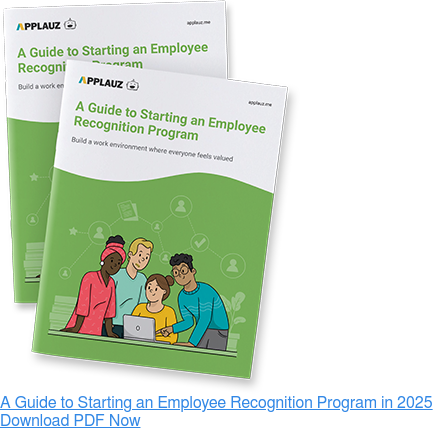Just because we know something is important doesn't mean we prioritize it.
At first, this idea may seem illogical. But if you really think about it, you'll see it applies to many areas of our lives.
For instance, we all know eating healthy food, exercising, or sleeping 8-hours are habits that are vital to our long-term well-being. Still, finding time to exercise, eat a balanced diet, and sleep 8 hours is a struggle for so many people.
In other words, guaranteed rewards today are generally preferred over uncertain future rewards. It's human nature! Short-term comfort generally wins.
Thinking long-term
This also happens when introducing new initiatives at work -- like recognition.
Recognition and appreciation are interpersonal habits. Much like exercising and eating healthy food, one must regularly practise these positive habits for the best results.
However, when launching a new culture initiative, many organizations often get thwarted off their paths. They have trouble staying consistent. And some people may have trouble integrating these new habits into their workflow.
Managers get busy. They might not know what to say or how often to say it. Also, higher-level issues can arise, such as HR lacking resources and time to grow recognition efforts.
All these challenges don't mean organizations should give up. Just like wanting to adopt better lifestyle habits, you can apply "best practices" to set your company up for success.
This article will explore all the obstacles for both HR and managers on the road to growing appreciation in the workplace. But most importantly, the solutions you can use to overcome these common challenges. Because it is possible to prioritize better habits. It just takes a bit of planning and effort.
9 Obstacles to Growing Appreciation in The Workplace (And How to Overcome Them)
Common obstacles for HR
The HR team lacks a plan for scaling recognition
Most HR leaders understand that recognition and appreciation are important. However, growing recognition at an organizational level can be a big challenge. In other words, how can HR ensure everyone is participating in regular recognition and appreciation – especially managers. For example, your managers might have all the tools to give recognition -- like a pen, paper, email, chat. Still, without clear directions, you are unlikely to see results.
How to overcome this: Like a workout plan, a recognition plan is essential to stay on track towards a long-term goal. A structured recognition plan holds everyone accountable for carrying out actual recognition events. When you give people specific, actionable goals, your company is much more likely to achieve progress, and ultimately, results. We’ve written a complete guide on building a recognition plan to help you get started with your plan!
Leaders reluctant to invest in recognition programs
Some company leaders believe money is the only currency of appreciation. In other words, if you pay your employees, they should not need extra recognition. Further, they believe a predictable ROI can't be identified. As such, these leaders may be reluctant to invest time and money into employee recognition programs. HR teams will have difficulty launching company-wide recognition or reward programs if they don't have buy-in from senior leadership.
How to overcome this: It is possible to convince recognition skeptics. A wide body of organizational and psychological research shows just how critical recognition and appreciation are to worker morale and happiness. And this research also shows that employee recognition isn't just some abstract HR concept; it has a very tangible productivity connection. Not to mention that appreciation is a universal language. In short, recognition is not a passing HR trend; it's something that is here to stay. Recognition should, therefore, be a priority for leaders rather than an afterthought.
Managers not feeling valued themselves
An important (yet invisible) barrier to growing a culture of recognition is managers not feeling valued or recognized themselves. It's a lot more common than leaders may assume. We must remember managers are employees too. And when they don't feel appreciated by their superiors or their employees, they likely won't feel motivated to offer genuine praise and appreciation.
assume. We must remember managers are employees too. And when they don't feel appreciated by their superiors or their employees, they likely won't feel motivated to offer genuine praise and appreciation.
How to overcome this: A culture of recognition is more likely to grow if everyone feels recognized and appreciated. As such, a company should not put all the responsibility of giving recognition on its managers. This often leaves managers feeling undervalued and resentful. You need proactive efforts from all leaders to maximize the impact of recognition. Your VPS, directors, senior managers and even the CEO should be giving recognition. At Applauz, we are proud to say that our CEO regularly gives recognition on our platform. We believe appreciation should be a fundamental value shared by all. Only then can you truly ingrain appreciation in your company's culture.
Underlying cultural issues
There may be underlying cultural issues in your organization -- namely, a lack of psychological safety and a climate of unhealthy competition. In these environments, people may feel a sense of anxiety over sharing the spotlight with others. Or worse, they may secretly root against one another. As a result, you may find employees are unwilling to express appreciation. Withholding recognition only reinforces the climate of unhealthy competition. In addition, if the company's morale is already very low, it's challenging to get people excited about a new program or practice. For instance, getting in the habit of eating well is much more difficult if your diet has been terrible for years than if you already eat well occasionally.
How to overcome this: Cultural change must start at the top. In short, it's not just HR's responsibility to fix culture issues with a singular program. Leaders in your organization must start leading by example with real, concrete actions. These behavioural changes will slowly increase feelings of psychological safety. In short, if employees see leaders exhibiting these positive qualities, they are more likely to follow in their footsteps. Over time, new habits and expectations will begin to form. And ultimately, the culture of unhealthy competition will dissipate.

Common obstacles for Managers
They don't know which actions deserve recognition
One of the questions we receive the most frequently is "what is a good reason to give recognition." In short, managers don't know which actions deserve official recognition. It's understandable to have these uncertainties, especially if you're using a recognition platform like Applauz. Your company has invested in a new tool to help boost recognition efforts, so you want to get involved. Or, even if you're not using a recognition platform, it's still common for managers to be unsure of what types of actions are worthy of "official" recognition.
How to overcome this: Our best advice is to recognize whenever you feel an employee did something noteworthy or went above and beyond their regular duties. It's that simple. Just use your common sense and good judgment. That said, we always advise people to err on the side of giving recognition rather than withholding it. Remember: There's almost no such thing as too much praise. That said, we have written a brief guide on ten reasons to give recognition which will help managers understand exactly which situations it is appropriate to share your appreciation with an employee.
Being too busy
Another major barrier to the recognition that we often hear is "I don't have enough time." We hear you. Many managers are very busy people – they juggle the job of managing others and executing the work themselves. However, we know that recognition is not a time-consuming task. Writing a few solid messages to your employees takes just a few minutes per week.
How to overcome this: You have to make the time for a new habit, just like wanting to exercise more. You must plan ahead. Do the same thing with recognition. Schedule a 20-minute event in your calendar every Friday and call it "recognition giving." During this time, think about what your employees accomplished that week. Did anyone's work, effort, or attitude stand out? Jot it down on paper and be sure to bring it up at your next meeting, write a private message to that employee, or post a recognition message on the Newsfeed of your recognition platform.
Unsure of what to say
Now we zoom in on the content of the recognition message. Being unsure of what to say causes a lot of stress for some people! As such, many managers simply say "good job" or keep recognition vague. While we think saying "good job" is better than saying nothing at all, recognition needs to be specific. In other words, the most meaningful recognition is personal; it shines a light on someone's unique personality and contributions.
is personal; it shines a light on someone's unique personality and contributions.
How to overcome this: We promise with a bit of time and practice, sharing your appreciation will become much easier. We developed a quick guide highlighting exactly what you should say to give powerful recognition. In short, remember the acronym PEP. It stands for Personal, Earned, Process. And if you're still really stuck, you can use our recognition examples list as inspiration. Just be careful not to only copy and paste. Great recognition should always be unique and crafted to reflect the contributions of the person receiving it.
Worry about creating jealousy among employees
Worrying over provoking jealousy among your team is a common – yet completely invisible – barrier to recognition. As a result of this worry, managers may resort to giving everyone vague and watered-down recognition so as not to shine the spotlight too brightly on one person or another. Funnily enough, doing this can actually create dissatisfaction among your team, as no one feels truly appreciated or recognized. This is a hidden recognition trap a lot of managers fall into. But it can easily be avoided!
How to overcome this: In our experience, we find when an employee earns their recognition – in other words, they genuinely worked very hard – it does not provoke jealousy in other team members. In fact, the opposite happens. When recognition is truly earned, other team members also know their teammate worked hard (they saw it too!). So they are more than happy and supportive of the person receiving recognition. If some of your team members are secretly jealous of an employee's well-earned recognition, there may be some deeper interpersonal issues within your team worth investigating.
Unsure of frequency
Another common question we get about recognition is related to the frequency of recognition. This is especially true in the context of using a recognition platform like Applauz. Managers are often unsure of how often to give recognition to employees. Fortunately, some research sheds light on the answer!
How to overcome this: First off, we believe there's no such thing as "too much" recognition. So never be worried about giving too much! Employees do want as much genuine recognition as you can offer. However, you should worry about giving too little! Studies show that monthly recognition seems to be the sweet spot to maintaining employee happiness and satisfaction. So whether you're using a platform like Applauz or not, aim to give everyone your sincere team praise at least once per month. If your team is large, aim to recognize at least half your team once per month.
or not, aim to give everyone your sincere team praise at least once per month. If your team is large, aim to recognize at least half your team once per month.
Worry about seeming disingenuous
Managers sometimes are reluctant to give recognition – they are not comfortable showing appreciation. They may feel like it will come across as phony or disingenuous. While this is a normal worry, in our experience, we find that employees will rarely perceive recognition as disingenuous, especially if the recognition is deserved and tied to their actual achievements.
How to overcome this: Recognition only risks being perceived as phony when it's half-hearted or if you are giving recognition to simply "go through the motions." To avoid this, recognize your employees only when it's truly earned. That's one of our best tips to overcome this problem. And make sure your recognition message highlights the great results the employee achieved. In short, add a few words about the person and highlight what they did differently. When your recognition is earned and personalized, it will always feel sincere and genuine.
Final Thoughts
Many people expect everything to go perfectly when attempting to adopt new habits. But when inevitable setbacks happen, it takes a big hit on their morale. As a result, they are more likely to give up altogether.
Realistically, you should expect setbacks in any long-term endeavour. The key to success is to maintain consistency amid these obstacles.
In other words, it's better to take a small action than to do nothing at all. And if you fall off course, remember that's normal. Just keep going.
The same applies to building better habits at work.
For example, every recognition message you write won't be perfectly motivating and inspirational. Sometimes you will only have time for a quick "good job." Other times, giving recognition may slip your mind for weeks at a time. That's ok too! As long as you pick back up and keep going, that's what matters.
About the author
 Michelle Cadieux
Michelle Cadieux
Michelle is a content writer for Applauz. She holds a Bachelor's degree in Psychology from Concordia University, and she has been writing about work and employee happiness for over five years.



